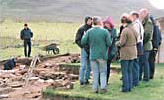Learning the Lessons - Partnership
Sustainability | Strategic Approach | Participation | Partnership | Alignment | Capacity Building | Affordability | Transferability
‘Local people and agency people working together for mutual benefit’

Partnership is a ‘buzz-word’ these days. The interest in it stems from the need to integrate the many ‘sectoral’ organisations and departments responsible for developing and implementing Government policy. When looked at in the context of ‘sustainability’, partnership takes on an additional dimension. Sustainability is explicitly about the integration of social, environmental and economic issues. Dùthchas recognised this from the outset, which is why its approach was founded on partnership. The reason we gathered as many as 22 Partners around us was in response to the many issues identified as important to local sustainability.
Working with a large partnership presents opportunities and also challenges. We had success in engaging so many Partners in all stages of the work. We facilitated them to work together on the issues of sustainability, to focus their attention on the Pilot Areas and participate directly in the work going on there. Partnership eased access to the partner organisations. It provided resources and agreement to support the Project in different ways. It also opened the way to explore the potential for greater ‘alignment’ between interests. Several of our Partners were pro-active in offering support and many invested significant time, attending meetings centrally and locally. Their involvement was welcomed by the local communities who got to know these distant bodies better and found out about their resources.

Partnership also presented big challenges both to the organisers and to the participants. We found that organisations are not well set up for partnership working, which is usually seen as being at the margins of their core work. Demands on time and other resources may not be adequately budgeted for and may be resented. Internal links between departments and areas may not function well.
Co-ordinating a large partnership is very demanding on time and resources, and many hours were spent chasing for information and organising meetings. In particular, partnership does not work well without strong focus, leadership and facilitation. Ideally the facilitation and leadership will be neutral to any of the Partners to avoid any inter-agency politics.
In summary, some of the key lessons of partnership working were that it is:
- essential for integration of the issues relating to sustainability
- important for simplifying access to support for communities
- good for disseminating information and ideas
- important for involving all the key players needed for the topic
- resource hungry
- requires focus, leadership, support and co-ordination
- challenges partner organisations who may not be structured appropriately
- requires good internal links
- on the edge of each agencies’ priorities
